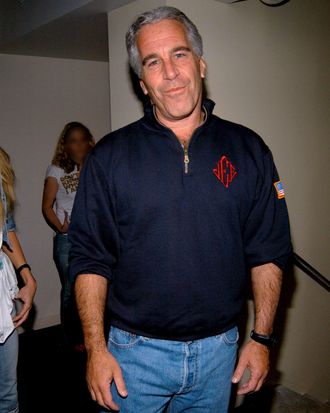
Since the arrest of financier and alleged sexual abuser Jeffrey Epstein last weekend, the question of where the well-connected onetime society fixture actually made his money has cropped up repeatedly. Intelligencer spoke with Thomas Volscho, a sociology professor at the College of Staten Island who is working on a book about Epstein.
For years, even before all the sordid details of his personal life were known, it has been a mystery to those reporting on Jeffrey Epstein how, exactly, he earned his prodigious fortune. You’re working on a book that explores this very topic. What’s the thrust of what you’ve found?
It’s very murky. I found a couple things, but it’s a mystery. I caught the Virgin Islands corporate filing where he listed his company as having $82 million. I found in a Citgroup court case that he was on the deed for 14 parcels of land for Elizabeth Ross Johnson, the Johnson & Johnson heiress. I don’t know in what capacity — he’s told people he’s a real-estate developer, so he might have helped her to develop Lightning Tree Farm in Dutchess County. That property is selling for $28 million. So that’s a client.
But naming his clients or assets is very tough. One of the things I did, and I see NBC did a story on this, was look into the charities he’s running. He was running charities for [Leslie] Wexner [the retail billionaire and Epstein’s one major client], and then was running his own charities, and they always had $9 million or $10 million donations circulating around them. And I always suspected, but not got around to pursuing, that he was embezzling funds. And I can’t prove that, but that’s my suspicion right now. NBC is reporting that the charities hadn’t really received the donations that he’d reported. So that could be a source of his finances.
Since his arrest, there have been quite a few conspiracy-ish theories floating around that say the reason Epstein’s finances are so opaque is that he’s been engaging in money laundering, and/or blackmailing famous investors we don’t know about by keeping their sexual indiscretions private. What do you make of these sorts of suggestions?
I think he’s engaged in blackmail. The reason I think this is that I read the Palm Beach police report when they did the search warrant. Epstein had advanced warning they were coming, so he scrubbed the place as much as he could, but he left wires and audiovisual cables for uploading video files to computers, and I guess the Palm Beach Police themselves installed some of his audiovisual surveillance equipment in his residence — it’s a service they apparently do, putting in security cameras for residents. And some of his victims, like Virginia Roberts, in her court filings, said that Epstein remarked to her that “information is king,” and mentioned that Bill Clinton was there because “he owes me a favor.” He bragged that that’s how powerful he was. So I suspect, based on that evidence, that’s it’s likely, since that’s the way Epstein operates, is he uses information to his advantage. Does he get investment money for his hedge fund that way? That’s a strong possibility. Does he not have to pay back investors maybe using the blackmail information as a threat? That’s a possibility.
Also, he’s not even a billionaire, right? That’s the other thing, here — he’s much less wealthy than people imagined. Why has that been such an enduring misconception?
He promoted an image of himself. He really did try to stay under the radar for many years, and [Steven] Hoffenberg [Epstein’s erstwhile partner who was convicted of fraud] said he really told him to do that; when he met Clinton, things fell apart, because people were like, “Who is this guy? He’s flying Bill Clinton on a jet!”
And the other part of it is that he’d be managing some kind of money, and then he’d borrow against it, and count that against the hedge fund. I believe that — Epstein is a fraudster. I found little bits of evidence, like misrepresenting his educational background. At Rockefeller University, he sat on the board, and in his bio he said he studied physics at Cooper Union, and then he went to Bear Stearns. Which isn’t true — most of his college study was at NYU.
Given this tangled web you think he might have been weaving, do you expect him to help bring down other big names in the coming weeks?
It’s certainly possible. As the New York Times is reporting, his finances are a major mirage, although he does have [some money]. But in terms of clients, the only other one I heard of was that he was managing money for the king of Spain.
This interview has been edited for length and clarity.






























